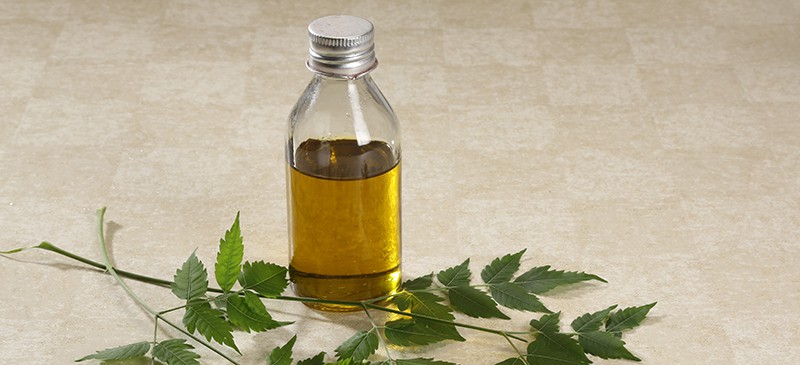
Neem oil is a naturally occurring pesticide found in seeds from the neem tree. It is yellow-to-brown and has a bitter taste and a garlic-like smell. While it doesn’t sound very attractive, neem seed oil can be very beneficial by providing an all-natural pesticide that controls both pests and diseases.
Loaded with nutrients, neem oil is also used in natural skin care products because it contains high levels of antioxidants that help protect the skin from environmental damage. Neem helps fight free radical damage in the skin because it contains carotenoids, which provide high antioxidant compounds. As a result, cold-pressed neem oil and neem extracts are widely seen in cosmetics such as soap, hair products, cosmetics, hand creams and pet shampoos.
Since neem is also especially high in important fatty acids and vitamin E and can quickly penetrate outer layers of skin, it is extremely effective in healing dry and damaged skin.
What Is Neem Oil?
Neem oil comes from cold-pressing the seeds of the neem tree, which is a tropical evergreen tree native to Southeast Asia and Africa. Other names for neem include nim, nimba, holy tree, bead tree, Indian lilac and margosa.
The bark and leaves of the tree are also known to be used medically and less often; the flowers, fruit and roots are used as well. The leaves are generally available year-round as the tree is evergreen.
What can neem oil be used for? Since the oil contains various active compounds that have insecticidal and medicinal properties, it has many uses and benefits. Neem seed oil is a common ingredient in various cosmetics including toothpastes, soaps, shampoos and more. One of this oil’s very interesting uses: it acts as a natural pesticide.
Neem seed oil is comprised of a mixture of components. Azadirachtin is the most active component and is used for repelling and killing pests. After the extraction of this active ingredient, the portion left over is known as clarified hydrophobic neem oil. As reported in a study published by Current Science, it works as an effective non-toxic insect control agent to agriculture.
6 Major Benefits of Neem Oil
Here are some of the top neem oil benefits:
1. Combats Bed Bugs
Bed bugs are some of the hardest urban pests to manage, and bed bug bites are certainly something we all want to avoid. The Environmental Protection Agency (EPA) has reported that neem oil, when combined with certain approved agents, can be safe and effective against bed bugs both at home and in commercial environments. In fact, the EPA says that cold-pressed neem oil is the only biochemical pesticide registered for use against bed bugs. Performance trials conducted show that neem oil helps control bed bug adults, nymphs and eggs.
2. Serves as a Natural Insecticide
Neem is considered a safe, naturally-occurring insecticide. The aim of a research study published in the Journal of Insect Science was to find a low-tech mosquito control method that can be used by local people, particularly in Africa.
As the study notes:
Control programs using conventional insecticides to target anthropogenic mosquito habitats are very expensive because these habitats are widespread, particularly in cities of most African countries. Additionally, there are serious environmental concerns regarding large-scale application of most conventional insecticides. Clearly there is a need for alternative methods that are more effective, less expensive, and environmentally friendly.
The research demonstrates how a crude extract of neem can inhibit the growth and development of mosquitoes, while a crude powder can kill off mosquitoes (most likely by suffocating the insects). Overall, the researchers conclude that “both types of preparations can be made and used by local people to control mosquito breeding in anthropogenic habitats, especially in urbanized areas.” Azadirachtin is the component of neem oil that appears to be responsible for about 90 percent of its anti-pest effects.
Neem products do not necessarily provide absolute insect control; however, frequent applications can reduce pest populations dramatically by repelling them and inhibiting their larval development, growth, fertility, mating and egg laying, as well as deterring feeding.
3. Assists Plants
Neem can also help to boost plant health by discouraging unwanted pests as well as fungus. In fact, the EPA points out that “cold-pressed neem oil has been used for hundreds of years to control plant insects and diseases.”
The American Orchid Society also reports that you can use neem seed oil as safe, natural leaf polish, though some plants may be sensitive. A neem solution for plants (more on that later in this article) should completely cover all plant surfaces for maximum effectiveness. One important precaution with plant use is never to use neem solutions on plants during hot weather (85° F or warmer) or in direct sunlight. In addition, avoid damage to plant tissues by placing plants in the shade until the neem application is dry.
4. Offers Wide-Ranging Skin Care Benefits, Including Help for Wrinkles, Dryness and Acne
Why is neem oil good for skin? The Department of Biochemistry and Biotechnology at Kwame Nkrumah University of Science and Technology (KNUST) states that neem seed oil is rich in essential fatty acids (EFAs), triglycerides, vitamin E and calcium. Because of its EFAs and vitamin E, neem seed oil penetrates deep within the skin to heal the minuscule cracks brought on by severe dryness. Fatty acids present in the neem kernel oil are oleic acid (52.8 percent), linoleic acid (2.1 percent), palmitic acid (12.6 percent) and stearic acid (21.4 percent).
The skin easily absorbs the fatty acids and vitamin E found in neem seed oil without leaving the skin feeling too greasy. Once absorbed, these powerful skin-boosting ingredients can help to rejuvenate skin health. Benefit-rich vitamin E acts as a free radical scavenger by hindering the oxidizing processes in the skin. It also promotes soft and supple skin.
It’s no wonder neem seed oil uses include it being a natural remedy for eczema symptoms — including dry, red, itchy skin. Researchers point out that neem seed oil can be a substitute for palm oil in making soaps so users can benefit from its beneficial medicinal properties.
What about the potential anti-aging effects of neem seed oil? A research study published in 2017 finds that topical application of neem may help to reduce many of the symptoms of skin aging, including thickening, wrinkles, moisture loss and redness. This study demonstrates how neem extract was able to prevent the formation of wrinkles in hairless mice subjects after UVB radiation. The researchers conclude that neem extract is a “promising anti-aging candidate for topical therapy products.”
Neem is often found in skincare products to naturally fight acne and for good reason! Research shows that neem seed oil has antibacterial abilities against the microbes that cause acne.
5. Boosts Hair and Scalp Health
The use of neem oil for hair and scalp concerns is also common. With its fatty acid content, neem seed oil is great for improving dry hair and nourishing the scalp. With its anti-fungal properties, it’s also a great ingredient for naturally fighting off dandruff, which is caused by a yeast-like fungus. You can look for neem seed oil and neem extracts in natural hair care products, or you can add a few drops to shampoos, conditioners and hair masks to boost their benefits.
6. May Help Against Malaria
A parasite transmitted by the bite of infected mosquitoes causes malaria. Neem oil makes for a great natural mosquito repellent that is safe to use. As reported in the Journal of the American Mosquito Control Association, when two percent neem oil was mixed with coconut oil and then applied to the exposed body parts of human volunteers, it provided complete protection for approximately 12 hours from the bites of all anopheline species. The study concludes that the application of neem oil can even offer protection from malaria in endemic countries.
How to Buy and Use Neem Oil
If you’re wondering where to buy neem oil, the easiest options include online or in health food stores. You want it to be yellow in color as well as cloudy and have an odor similar to garlic and sulfur. Look for 100 percent pure neem oil. Also, opt for certified organic neem oil because this ensures that it doesn’t contain unwanted solvents or petrochemicals that may have been used in the purification process.
READ RELATED: The Dark Spot Treatments That Really Work, According to Dermatologists
If you’re trying to fight off bed bugs or mosquitoes, you can look for neem products that are healthier yet effective alternatives to using harsh chemicals. Regarding plants, The American Orchid Association advises not to use neem on plants during hot weather and to keep plants in the shade until the neem solution dries completely.
You can also use neem seed oil to provide therapeutic benefits to your skin and hair. You’ll find neem already present in many cosmetic products, or you can add the oil to your own homemade products.
Store neem seed oil in the refrigerator or in an area that is cool and dark so that it will keep longer. It should keep for a year or two. Make sure you label it appropriately wherever you choose to store it. Neem seed oil can, however, solidify at low temperatures. You can simply place the container in warm water to get it back to a liquid form for use, but make sure it doesn’t get too warm since heat destroys the azadirachtin (the most effective component).
History and Interesting Facts
The neem tree, Azadirachta indica, is thought to have originated in India or Burma. Neem is a large, fast-growing evergreen that can reach approximately 40 to 80 feet in height. It is drought-resistant, heat-tolerant and may live up to 200 years! It grows in many Asian countries as well as tropical areas of the Western hemisphere. People have been using neem seed oil, which comes from the tree’s seeds, for its medicinal and insecticidal properties for centuries.
The major active constituents in neem are terpenoids, such as azadirachtin, which are considered antimicrobial and act as insect repellants among many other actions. People in the tropics sometimes chew neem twigs instead of using toothbrushes. However, this is not a good idea since neem twigs can experience contamination. A safer way to use neem for oral healthcare is to purchase a natural neem toothpaste and/or mouth wash.
Neem Oil Recipes
Wondering how to use neem oil starting today? Here are some great ideas:
Anti-Wrinkle Neem Oil Cream with Lavender
Ingredients:
- 8 ounces of organic jojoba oil
- ½ ounce of pure, organic neem seed oil
- 4–5 drops pure lavender oil
Directions:
Place ingredients in a cosmetic container or small cosmetic bottle. Mix or shake well. Apply as a moisturizer to your skin.
For skin problems like acne or eczema, apply directly onto the skin two or three times a day.
You should not use undiluted neem seed oil on your skin. Always try a very small amount diluted on a small area of skin to make sure your skin does not have a negative reaction.
Neem Oil Foliar Spray Solution
(from the American Orchid Society and suggested by growers)
Ingredients:
- 1 teaspoon neem oil
- ½ teaspoon plant-safe liquid soap
- 1 quart warm water
Directions:
Place in a plastic spray bottle and make sure to mix all ingredients well, shaking intermittently to ensure they remain well-mixed.
Because the oil smothers insect pests, be sure to completely cover all plant surfaces for maximum effectiveness. Some sources indicate that the mixture begins to break down after eight hours, so a fresh batch should be used at every application.
Neem Side Effects and Precautions
Is neem oil dangerous to humans? Breastfeeding women or pregnant women should not use neem seed oil. For pregnant women, it can encourage miscarriage. Do not use neem products with your children unless your healthcare provider approves of the use. In infants and small children, serious side effects can include vomiting, diarrhea, drowsiness, blood disorders, seizures, loss of consciousness, coma, brain disorders and death within hours of taking neem seed oil internally.
For most adults, neem is generally safe for: topical use on the skin for up to two weeks, when taken by mouth for up to 10 weeks or when applied inside the mouth for up to six weeks. Neem can be unsafe for adults when used in large amounts or for extended periods. The main concern with overuse is it may harm the liver or kidneys.
Check with your doctor before using neem products if you have a medical condition or are currently taking medication.
Neem is typically not a recommended natural remedy for people with the following health concerns/situations:
- Autoimmune diseases including multiple sclerosis (MS), lupus or rheumatoid arthritis
- Infertility
- Diabetes — Neem may cause blood sugar to go too low, so if a diabetic uses neem, blood sugar must be monitored closely.
- Surgery — Stop neem use at least two weeks before surgery.
- Organ transplant
Neem may interact with the following medications: anti-diabetes drugs, lithium and immunosuppressants.
Some people may be sensitive to topical use of neem. Since neem is a strong oil, it’s best to dilute it by combining it with equal parts of a carrier oil such as coconut oil. It’s also a good idea to try a very small amount of the diluted oil combination on a small area of skin to ensure you do not have a negative reaction.
If we are talking about neem seed oil as a pesticide, just how safe is it then? According to the EPA, “No risk to human health is expected from the use of cold-pressed neem seed oil because of its low toxicity via all route of exposure.” Azadirachtin and other active ingredients in the neem seed have insecticidal properties that are effective against a broad spectrum of insects, many mites and nematodes and even snails and fungi. According to the EPA, “When used as directed on product labels, neither clarified hydrophobic extract of neem oil nor azadirachtin are expected to harm non-target organisms.”
Final Thoughts
- What is neem oil used for? One of the most common uses is as an insecticide. For hundreds of years, people have been using neem oil to control plant insects and diseases.
- What bugs does neem oil kill? It kills bed bugs (at all stages) as well as mosquitoes.
- You can use neem seed oil for plants as a foliar spray and natural leaf polish that discourages fungus and unwanted pests.
- The use of neem oil for skin health includes its application for dry skin, eczema and acne.
- For topical use of neem seed oil, dilute it with a carrier oil such as coconut oil.
- Do not use neem products on infants or small children, or if you are pregnant or looking to become pregnant. You should also check with your healthcare provider before using neem on children of an older age, if you’re breast feeding, if you have an ongoing health condition or are currently taking medication.
Source: Dr. Axe






